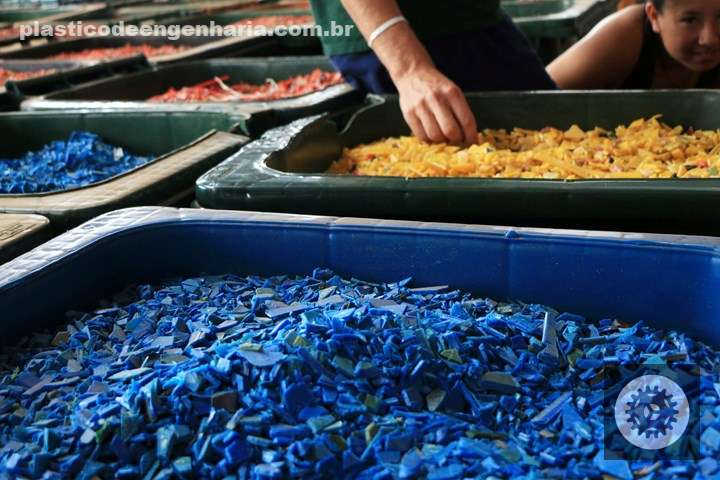


Adições de Aditivos na Indústria de Plásticos: Mudanças Sustentáveis e Inovações

BASF Plastics Additives is the “first additives” supplier to commercially launch ‘biomass balance’ additives, with its new BMB line of stabilizers. Photo Credit: BASF
“From a materials perspective, sustainable solutions are the name of the game,” says Susan Jackson, head of communications and sustainability, BASF Performance Materials NA. In addition to seeing more recycled grades, bio-based materials and biodegradable plastics, processors will also learn more about different plastics sorting technologies that now exist to make it easier to get plastics back into the value chain. “The key to increasing the rate of recycled materials lies in generating better sorted waste streams across the globe. This can only be achieved if the access barriers to plastic identification technology are lowered.”
Specifically addressing the polyolefins arena, Joel Morales, v.p. of polyolefins Americas for Chemical Market Analytics, says processors will see two new North American entrants that were not making pellets during the last NPE. Heartland Polymers, Alberta, Canada, with polypropylene and Shell Polymers in Monaca, Pennsylvania, with polyethylene, which together are adding nearly 4.9 billion lbs of new capacity to the region.
He says, “Processors are looking toward new entrants to improve the competitive environment in the North American market. While traditional virgin production for polyolefins has continued to grow in recent years, so has the availability of mechanical recycling and chemical recycling options. Processors will look to balance the demands of their customers to develop sustainable products, at the same time keeping in mind the competitive, abundant offerings of virgin materials.”
Expect to see materials that enable fully recyclable monomaterial film structures and materials that contain or enable the use of postconsumer recycled material, according to Doug Biela, NOVA Chemicals’ leader of polyethylene market management.
Companies that do not prioritize sustainability risk being left behind, say team members from Avient. The company is expanding its portfolio of sustainable solutions, including more bio, recycled and eco-conscious materials, additives, technologies and services for helping customers meet consumer demand and also meet new government regulations.

Look for materials that enable fully recyclable monomaterial film structures and materials that contain or enable the use of postconsumer recycled material, says NOVA’s Biela. Photo Credit: NOVA Chemicals
Aditivos Complementam Tendências de Materiais
The elimination of forever chemicals from the supply chain is among the major trends, says Jeroen Frederix, SI Group’s market development manager for circular economy. A key example is the industry’s search to replace per- and polyfluoroalkyl substances (PFAS) in PE films and other applications, which have been found to present potential health hazards and face increased regulations for their use. “Sustainability will be an overarching topic due to further progress both domestically and globally from a legislative perspective and increasing end-market pull for more circular and low-carbon solutions,” says Frederix.
NOVA’s Biela says, “The development of new fluorine-free polymer processing aids will continue to address pain points associated with first generation of such products.” He also notes that antioxidant suppliers continue to develop stabilization systems to facilitate and enhance mechanical recycling of PE.
In that spirit, sources from Ampacet note they are highlighting their PFAS-free processing aids, introduced in early 2023, and later that year launched a product line extension to include two globally compliant additives that are said to perform as well as fluoro-based processing aids in blown film extrusion for multiple end-use applications and at the same LDR as most common Ampacet PPAs.
BASF’s Plastics Additives team says that with their latest development in additives, processors will be able to increase recycled content in the final application, as well as mitigate challenges, such as melt-flow, gel formation or mechanical property deficiencies usually observed when processing recycled plastics. An additional trend is to address recycling challenges of packaging in the initial design phase focusing on recyclability for which additives can play a key part, such as Irgaclear XT 386 clarifier for designing transparent recyclable packaging.

Sorting technologies, such as that offered by BASF subsidiary trinamIX, will be showcased at NPE 2024. Photo Credit: BASF
O Que os Processadores Devem Perguntar
Processors ought to ask about new and underway developments based on these key trends, say industry sources. The Avient team sources say that in order to be better equipped for the future and stand out from their competitors, processors should inquire about the entire product life cycle, from material selection to end-of-life considerations. This involves using materials and additives that can assist in incorporating more bio and recycled content, as well as using more eco-conscious ingredients.
For this, they should invest time and resources in learning about sustainable material and additive options, design, government regulations and all the various aspects of the manufacturing process that contribute to sustainable production.
Says BASF’s Jackson,“We’re working with customers on recycling and designing for sustainability. We have some cool tools — Utrasim, which is our proprietary computer-aided engineering program and 3DP expertise with our Forward AM business, which can assist with rapid prototyping in producing samples, for example.” The company is also highlighting mechanically recycled plastic grades and advanced recycling grades that are being used in automotive and consumer applications currently, but have opportunities for broader use. Also highlighted are education around topics such as the biomass balance approach, product carbon footprint and optimal sorting technology from BASF’s subsidiary TrinamIX and how they support a circular economy.
In addition to showcasing its Evercycle additives tailored to improve the quality of mechanically recycled plastics, SI Group is ready to discuss alternatives for PFAS, and new non-dust additive developments that increase PCR in polypropylene automotive compounds.
Say Ampacet sources, “We are constantly expanding our line of R3 Sustainable Solutions products. PET recycling has gained a lot of traction because of commitments that CPG companies have made over the past few years. These products include compatibilizers, odor scavengers and antioxidants.” Ampacet is also touting its new, “first of its kind” additive masterbatch technology for a range of thermoplastics that enable processors to create permanent lettering and designs in intricate detail on black and dark plastic surfaces.
Suited for adding permanent color logos, intricate designs, serial numbers, QR codes and bar codes for applications such as consumer electronics, automotive interiors, eyewear, housewares, appliances and accessories, ColorMark is available in FDA and NIR-sortable formulations, which offer sustainability benefits and could replace paper and labeling, thereby reducing plastics use.
Colaboração é a Chave para o Futuro
The future is mainly about collaboration as the use of and need for recycled plastics has increased complexity significantly, says the BASF Plastics Additives team. “We are looking to address specific challenges such as viscosity, yellowing and also mitigation of impurities. In terms of our stabilizers solutions for virgin polymer systems, we are tailoring specific blends for addressing the need for less migration. Finally, as the first additive supplier, we recently launched ‘biomass balanced’ (BMB) certified antioxidant solutions to help processors improve their carbon footprint.”
As políticas e regulamentos ambientais estão mudando rapidamente, e a indústria de plásticos precisa se adaptar para sobreviver e prosperar. O mercado está se realinhando com novas exigências para produtos mais ecológicos, recicláveis e eficientes. O setor de aditivos plásticos, portanto, representa um campo de batalha essencial onde a inovação tecnológica e a sustentabilidade se encontram para moldar o futuro dos materiais.
#NPE2024 #Follow #Megatrends #Materials #Additives
Última atualização em 25 de abril de 2025








